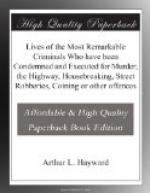As his end drew yet nearer, he appeared more and more confused and uneasy, but not a bit more penitent or ready to confess, notwithstanding that several persons, and some of them of distinction had applied to him in the cells and earnestly exhorted him to that purpose. He also drank excessively, though so near his end, and his conscience so loaded with such a weight of horrible offences.
Yet it is very probable that he would have been much more tractable in his temper and ingenuous in his confessions, if he had not been continually visited and kept warm by a certain bad woman he at that time owned for his wife. This wretched creature was employed by some persons who thought themselves in danger if Neeves should once become truly penitent, to keep him full of idle thoughts and delusive promises to the very hour of his death, in which (from the temper of the fellow), they flattered themselves his cowardice would make them safe. In which wicked design both they and she succeeded but too well, for he continued careless, obstinate and impenitent to the last moment of his life, and at the place of execution staggered and was scarce able to stand, bawling out to a man in a coach who was to carry away his body, until the Ordinary reprimanded him and told him he believed he had drunk too much that morning; to which Neeves answered, No indeed, Sir, I only took a dram. He then besought him that a Psalm might be sung, which request of his being complied with, he yet could not forbear smiling while they were singing.
[Illustration: AN EXECUTION IN SMITHFIELD MARKET
(From the Newgate Calendar)]
The father and wife of Mr. Nichols, the barber so often mentioned, got into the cart and earnestly enquired whether the deposition he had given against him was the truth or not. Neeves, thereupon, with tears in his eyes owned that it was not, and thence fell into a greater agony than he had ever been perceived in before, beseeching God to have mercy on him for shedding innocent blood, into which he had been induced by the persuasion of others, who represented it to him as a means for getting money both for them and him, owning that he never saw Nichols in his life before they were at the justices together. After this he cried two or three times unto God to forgive him, and so was turned off with the rest on the 27th of February, 1729, being then about twenty-eight years of age.
FOOTNOTES:
[83] See page 445.
The Lives of HENRY GAHOGAN and ROBERT BLAKE, Coiners
Notwithstanding the number of those who have been executed for this offence, yet of late years we have had frequent instances of persons who rather than groan under the burden of poverty or labour hard to get an honest livelihood, have chosen this method of supplying their extravagances and consequently have run their heads into a halter.




